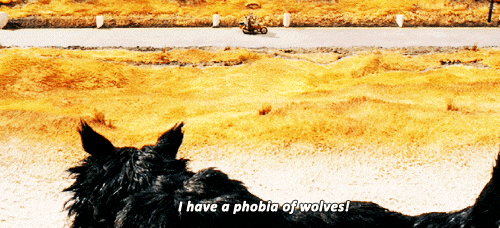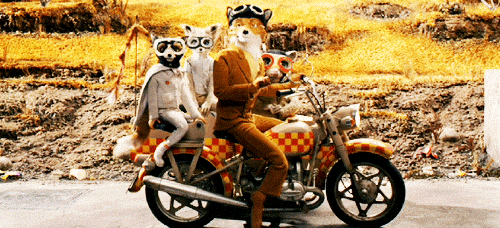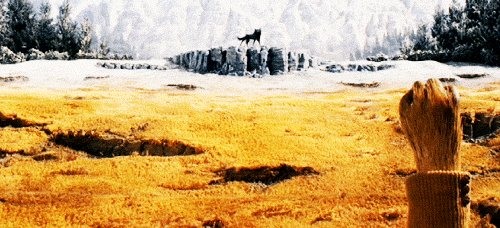#with many phobias you can limit your exposure to potential triggers but dogs are everywhere every day
Note
I have a phobia of dogs like can't stand seeing images of them phobia but I love your work so much, I don't know what it is but there's something beautiful about how I can look at it without feeling that phobia. Like being on top of a mountain and seeing the view of the world below or how fire looks pretty close up. Your art to me feels like that scene in fantastic mr fox with the wolf.
Ah, that's both heartwarming and very interesting, I've never heard of any cynophobes liking my work! Thank you!
(I won't bother you about it of course, but I can't help but wonder if it's the same thing for all furry/anthro art you see or for some reason just me, and if it's the latter, what could be making my stuff more palatable for someone who is that intensely uncomfortable with canines. My style isn't realistic but it isn't super stylized and exaggerated either. Is it about the anthropomorphization and the humanlike features, expressions and behavior? When I draw actual dog-shaped-dogs, are they harder to look at?).



#Fantastic Mr. Fox is one of my all time favorites#number one comfort movie too#recommending it to everyone#answered#anonymous#it must be rough living with a fear of dogs#with many phobias you can limit your exposure to potential triggers but dogs are everywhere every day#and I know some (even otherwise sensible) people can react really badly when they hear dogs make you feel uneasy#for such a common and well recognized phobia it's often trivialized and sneered at#at least from what I've seen#one of my brothers has/had it
536 notes
·
View notes
Text
I heard it was national coming out day yesterday, as I, a New Zealander, tend to always hear about days too late. I wanted to share something. I don’t really have many experiences with coming out but I have one that barely counts that I’m fond of. I actually found this in my drafts and thought why not. Even if it’s nothing said directly, it was still picked up on.
The context: Year 13 English Speech Assessment, the dreaded one. It was my last year, I knew I wanted to have a REALLY good speech (whether I achieved that or not is debatable but I was happy with it considering the time limit and other factors). I’m just going to share that with you first of all.
Fear is a universal infection to which there is no universal cure. Fear does not discriminate, diversity only provides it with more opportunities for it to act. Fear will lay dormant in your bones until you come face to face with the trigger, when it will pounce and enclose you in an ever tightening embrace that only loosens when you remove yourself from the situation. Fears can be irrational or rational, it could lend a helping hand or sabotage you. We tend to think of fears as bad things but they started as an evolutionary survival instinct, they crowd the line from helpful to unhelpful, too diverse to be contained. So, who in here is scared of something? Put your hand up if you have a fear, any fear at all. If you didn’t put your hand up then science says you’re lying, think about that. There are incredibly rare conditions where a person doesn’t feel fear but these are usually linked to some sort of brain damage. Fear is unavoidable, from birth to old age, no one is truly fearless. So, why do we fear things? What types of fear are there? Despite the diversity, is there a connection? We’ll explore that in this speech.
Why do we fear things? Scientifically, it’s a survival instinct, programmed into the nervous system, it has a purpose at a very primal level, something to be helpful to us. It’s impossible to truly have no fears, there are neurological and psychological conditions that could inhibit a fear reaction but these are rare. Some people will have more fears than others, but there will always be at least one. At a very basic level, humans are hardwired to have a fight or flight reaction to perceived danger. If we didn’t, we probably would’ve gone extinct years ago. We would’ve been killed by predators for which we held no fear, precaution thrown out the window with a scoff of disregard. All humans are born with two innate fears, the fear of falling and the fear of loud sounds. Every other fear is something we develop with time and experience, usually during the first six years of your life. It isn’t entirely surprising when you think of it from an evolutionary viewpoint, loud noises can indicate predators or danger and falling from a height holds the potential to kill us. But the rest of our life, why do we develop our fears? When I was very young, I thought I had an experience involving a dog that was more than double my height, it started running at me but no one came to my aid despite my cries for help. It’s vague now but I never did remember how it ended. The truth I learned about 10 years later was that this experience was a dream but since that day I’ve been terrified of dogs. Experiencing or witnessing a traumatic event is the most common cause of fear, though it can also be learned from others who have the fear. But, traumatic events. Car crash, nearly drowning, getting burnt in a house fire, seeing someone get shot or being shot yourself. Interestingly enough, a lot of these events are related to death. You have a brush with death and he slips you a fear as a response to you cancelling your appointment with him at the last second. Which, fair enough, a little more warning is appreciated. We take this fear, we nurture it with exposure, it blooms and if you take particularly good care of it you might grow a phobia. There is a thin line between a fear and a phobia but it is a line nevertheless.
What types of fears are there? In a more general sense, there’s 5 types of fear. These are known as Extinction, Mutilation or Bodily Invasion, Loss of Autonomy, Separation or Abandonment or Rejection and Humiliation or Shame or Worthlessness. Most fears will fit into these categories if you explore the reasons behind them. But what exactly do these categories mean? Extinction refers to the fear of ceasing to exist, of annihilation. Simply saying a fear of death really doesn’t cover the extent of this category. Mutilation or Bodily Invasion is the fear of losing a part of our body, of having the boundaries of our body invaded or losing a natural body function. These are fears where we feel physically unsafe or under attack. Loss of autonomy is what could be described as claustrophobia but it's also emotional claustrophobia. Fear of being restricted, confined, trapped, suffocated, overwhelmed or smothered. Separation or abandonment or rejection is exactly as it’s said. From an evolutionary standpoint, it makes sense. If a human was kicked out of a tribe then they would probably die. From an emotional standpoint, we’re social creatures, we feel the need to belong. Humiliation or shame or worthlessness is also as it’s said, alternatively known as ego death. We have a craving for approval, to feel lovable and worthy of love. Ego death messes with this and leaves us questioning if we are indeed worthy. If we analyse some of my fears we’ll see how they sort into these categories. Scared of heights? Extinction fear. Scared of public speaking? Humiliation/shame/worthlessness fear, also known as ego-death. Scared of dogs? Mutilation or bodily invasion fear. Scared of small places? Loss of autonomy fear. Scared of coming out? Separation or abandonment or rejection fear. There’s common fears and unusual fears within these categories, some you’ve heard of and some you haven’t.
The causes of fear are diverse, the types of fear are diverse, even those with the same fear react differently, experience it differently, but there is always the common factor of fear itself. Fear manifests in different ways, with different triggers, with different intensities and has different consequences. But that fear you feel in the pit of your stomach, being frightened, being scared of every future second and the possibilities it holds are the same. The label of scared is one we all keep, be it buried away or worn on a sleeve. Fear follows us everywhere hidden away or in plain sight. It tails us like an assassin waiting for the perfect time to strike. And we relate to each other, we sympathise and we empathise because we know how the other feels.
In conclusion, fear is a universal infection to which there is no universal cure. There are so many strands for it and so many ways we caught the infection. But regardless of this diversity, regardless of the true extent of the infection, we relate. We relate to the paralysing fear, to the absolute panic flooding the brain, to each other. With so many different countries, cultures, religions, languages, people and personalities in this world it’s hard to find a universal connection. But maybe the connection doesn’t need to lack diversity, maybe a diverse connection through the human race is what connects us all. Maybe that connection is fear.
Now you might have noticed a little line in there in the second body paragraph, really only four words. But those four words made the rest of my speech seem simple in comparison because I was so scared to say them. ‘scared of coming out.’ This was quite a step, I only had one person I knew in real life that knew I wasn’t straight and they weren’t at my high school. And suddenly I just decided to tell my entire class, should they pick up on it, that I’m not straight. It was my way of taking that step, rather than telling one person I was just going to tell everyone.
The result? People noticed. I did pause before saying it due to nerves so they probably started paying attention. My friend since kindergarten came up and hugged me and told me she was proud of me despite the fact that I was still technically being filmed and hadn’t done my Q&A section. I remember one tear fell. I was trying to keep it together because I was still being assessed but that one tear escaped, I was so emotional. I had some others in the class showing support. Some people seemed confused, some people smiled, there was not a single negative comment. And the surprising part? It never really left the class, not in a way that spread anyway. I even had someone ask me if I was out to my parents, if they could tell their mum or if I wasn’t comfortable with that (our parents are friends) and! I never expected that level of consideration!
My teacher I think was confused throughout the whole thing, like she’d missed something important and was trying to figure out what. But we had lunch next and what do I get? An email from her.

Not going to lie, I started crying. That was really the first adult response I’d had and it was positive.
Fast-forward a few months to my birthday and I get a card from a good friend of mine. She never said much about my speech at the time and I was a little concerned because I knew she had a religious background. Written, ‘I just can’t emphasise enough how good your speech was Lindsey! I never really told you, but that blew me away! You’re so brave and strong Lindsey! I don’t think there was anyone that was not touched by your speech, you came out of nowhere and hit everyone in the heart!’ there’s no way of telling if she was referring to that line at all but really? It seems like she was at least a bit to me, based on how I know her. Even if she wasn’t it’s general support that I appreciate (she’s great haha, working my ego up).
The point is, I took a risk and not all experiences are bad. Nothing bad came out of this. Not one thing. I know I never said ‘I’m bisexual’ explicitly but people were smart enough to gather the non-straight implication and do what they wanted with it. Somehow my parents still don’t know and this community talks, especially when your mum knows everyone. It’s not that I think they’d react badly it’s just a daunting experience and they’re also VERY oblivious and keep missing every single subtle and not subtle hint I throw their way (I have done everything but say hey guys, I’m bisexual. Seriously. I’ve even used the term girlfriend!). And I appreciate people keeping it to themselves despite me never asking. When I went into that speech I half expected my mum to have been told by 5 different people by the end of the day, there was nothing. I kept expecting it, nothing. It’s been months, nothing. It’s a little bit of respect I never expected when I shared it with so many people.
I just think, maybe this won’t mean anything to anyone but sometimes hearing a positive experience is nice. And I’m more than happy to be that person. I’m bisexual and proud and I will let it be known on my own terms, in a community of supportive people. Even if they don’t agree, they don’t actively disagree and I appreciate that too. I think it’s an attitude the world would be better with. So if it’s still that day in your timezone, happy coming out day. It’s okay if you’re not out and it’s okay if it’s hard for you to come out. I mean, I’m somehow out to pretty much everyone but my family at this point even though they’d be fine with it. It’s your process. Take your time. I’m proud of where you’re at no matter what!
#national coming out day#bisexual#y'know this might not mean anything to literally anyone reading it#and that's okay#cause if it doesn't no harm has been done#and if it does then well it does#not losing anything here
13 notes
·
View notes